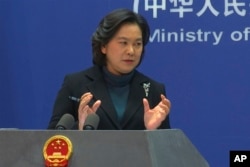Threats of violence and rape. Accusations of being a traitor. Insults regarding appearance. Asian journalists covering politics or human rights in China, especially women, risk a barrage of online assault every time they hit publish.
Top China journalists and other China analysts are facing an "ongoing, coordinated and large-scale online information campaign” on Twitter, according to an Australian Strategic Policy Institute (ASPI) report, which says women of Asian descent are facing the worst of the vitriol.
The think tank, based in Australia’s capital of Canberra, determined that the inauthentic Twitter accounts behind the operation are likely another iteration of “Spamouflage,” a pro-Chinese Communist Party (CCP) network that Twitter attributed to Beijing in 2019.
The goal of the current campaign is to discredit the women’s work in the eyes of both domestic and international audiences, analysts told VOA. The strategy meshes with Beijing’s broader global media effort, as documented by the International Federation of Journalists, to improve its reputation around the world by influencing coverage in its favor and quelling criticism.
“This kind of targeted trolling that female activists and journalists are facing has become so vicious, so concerted that it is driving some either off social media altogether or to practice some degree of self-censorship,” said Mei Fong, chief communications officer at the non-governmental organization Human Rights Watch (HRW), in an email to VOA. She added that the campaign aims “to viciously silence those speaking truth to power.”
Fong is among the women named in the ASPI report who have faced the latest slate of harassment.
“This campaign shows that the Chinese government is very likely increasing the sophistication of the campaigns that harass these women,” said ASPI researcher Albert Zhang, who co-authored the report. “I can’t imagine being on the receiving end of these types of activities."
Liu Pengyu, a spokesperson for the Chinese Embassy in Washington, told VOA that "China condemns the harassment of female groups and opposes linking it to the Chinese government without evidence."
“China always welcomes media agencies and journalists from other countries to report in China in accordance with laws and regulations, and provides convenience and assistance for them to work and live here,” he said. “What we oppose is ideological bias against China, fake news under the cover of freedom of the press, and violation of professional ethics.”
According to a Twitter spokesperson, the activity identified in ASPI's report was part of the "Spamouflage" network, and the company has suspended more than 400 associated accounts for violating platform policies. The spokesperson called the investigation ongoing.
Distinctly different
Some of the world’s top China analysts have been on the receiving end of this smear campaign, including journalists like Lingling Wei of The Wall Street Journal, Alice Su of The Economist, Jiayang Fan of The New Yorker, and Muyi Xiao of The New York Times, according to the ASPI report. Some of the women named in the ASPI report declined to speak with VOA, citing safety concerns.
“Even speaking publicly about the problem risks inviting more online abuse,” HRW’s Fong told VOA.
China experts have faced harassment online for many years, with some of the harassment tied to the Chinese government, according to Zhang.
But this recent campaign is distinct because it appears to be — by design — exclusively targeting women of Asian descent.
ASPI identified hundreds of Twitter accounts that were created with the singular objective of targeting these women.
“This time they specifically targeted the Asian female cohort,” HRW China researcher Yaqiu Wang told VOA in an interview. Targeting this subset in such an intentional way is “a new phenomenon,” she added.
Wang said she has faced online harassment, including sexual harassment, over the years due to her work.
“There’s inherent misogyny within the disinformation propaganda apparatus,” Wang said. “It’s easier to discredit women. When you say misogynistic, sexist things about women, there’s an audience — more so than if you’re attacking men.”
The focus on women underscores “a strain of misogynistic nationalism that seems prevalent in China today,” according to Louisa Lim, a senior lecturer in journalism at the University of Melbourne. She cited a recent campaign against effeminate men as an example of this misogynistic nationalism.
Much of the English- and Mandarin-language campaign has focused on accusing the target of purveying anti-China coverage or fake news. But other aspects of the campaign have been tailored to the individual target, such as the hashtag #TraitorJiayangFan, targeting The New Yorker staff writer, according to the ASPI report.
Attacks also include messages like "traitors don't die well" and "traitors often come to a bad end."
The Coalition Against Online Violence, a consortium of groups working to address online harassment facing women journalists, condemned the smear campaign in a June 10 statement.
Familiar pattern
The harassment outlined in the report is all too familiar for Melissa Chan, an independent journalist based in Berlin. Chan was not named in the report, but she, too, has faced this kind of harassment for several years over her coverage of China, she told VOA.
“Rape threats, death threats, race-traitor accusations — I’ve had the whole gamut. This pretty much happens every week if not every day,” Chan wrote in an email to VOA. “Some of this harassment is from anonymous accounts, but there have been plenty of real users — often Chinese users who have access to Twitter and so presumably are living in the U.S. or elsewhere — who attack."
The Chinese state and many Chinese citizens view ethnic Chinese people of other nationalities as betraying and slandering the “motherland” when they criticize Beijing, Chan told VOA, which is consistent with ASPI’s findings on the recent campaign.
Chan has found certain topics tend to trigger harassment, particularly social media posts related to U.S. foreign policy on China, Hong Kong, Taiwan, human rights in China, and her own identity.
But for Chan, the harassment motivates her to continue doing her job.
“If anything, online harassment only makes me double down on my commitment [to] reporting on authoritarian states like China and covering the voices of the voiceless, including Uyghurs, Tibetans, and other groups that face existential threats against Beijing’s unitary vision of China,” she wrote.
In recent years, the Chinese government has made it increasingly difficult for foreign journalists to report on China from inside the country, according to CNN.
The ASPI report refers to this particular Twitter campaign as an example of “digital transnational repression,” suggesting that Beijing is now looking to hinder journalists outside the country from covering China in ways it finds unacceptable.
Although “this activity is escalating,” according to the report, ASPI also found that Twitter has taken down some — but not all — of the accounts.
Chan and Fong said that platforms such as Twitter have a responsibility to do more to protect users.
Although it’s difficult to measure how effective this strategy has been at silencing journalists, ASPI’s Zhang said, “our qualitative assessment is that definitely it is having really quite a severe impact on the ability of Asian female journalists and journalists generally in the Western world to be able to speak about China.”





